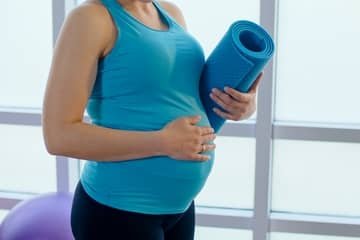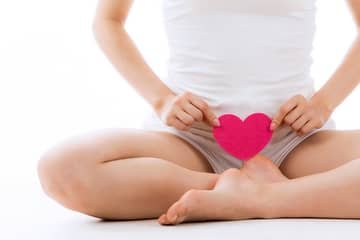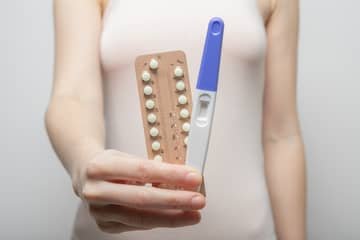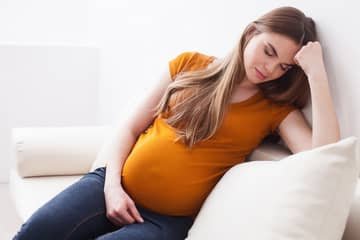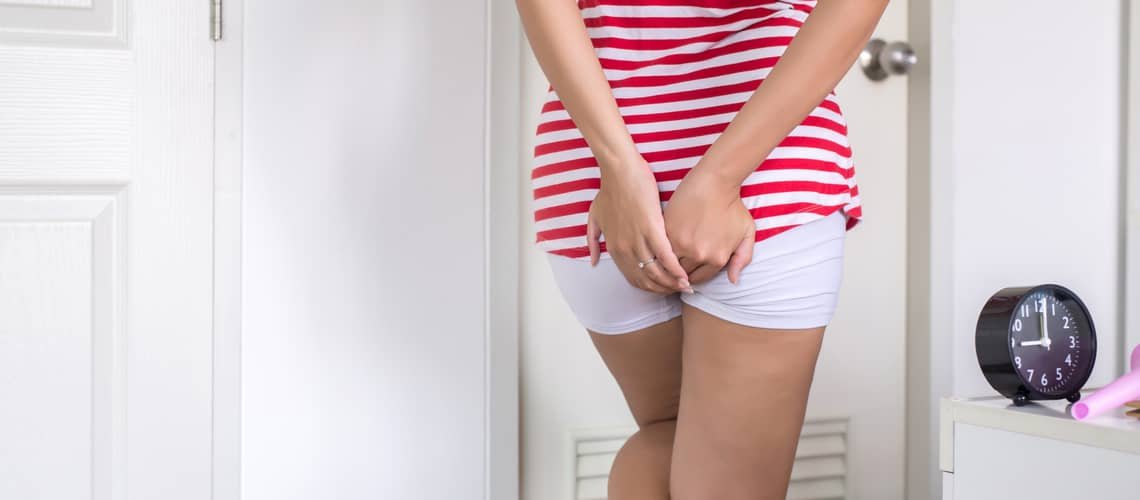
Hemorrhoids during pregnancy are often painful and bleeding. How to treat them?
The problem of hemorrhoids during pregnancy is indicated for more than half of women. For some of them, problems with the "golden vein" (hemorrhoids) appear only after childbirth, but regardless, it is another inconvenience accompanying pregnancy. Despite the fact that mostly from other mothers, pregnant women learn about morning sickness, vomiting, exhaustion, heartburn or swollen legs during pregnancy, only a few mothers mention painful hemorrhoids. This intimate problem causes an unpleasant feeling and even pain in the anus. Problems with swelling or bleeding of the golden vein are not only the prerogative of pregnant women, but it is precisely during pregnancy that there is a high probability that this problem will appear. How to treat bleeding hemorrhoids? How do hemorrhoids manifest themselves in pregnancy?
Discomfort during defecation, pain or blood in the stool? During pregnancy, these signs can be a symptom of irritation of the golden vein in the anus. Under normal circumstances, the golden vein is a part of every human organism and helps with emptying . So, in general, the gold vein is not a problem. It occurs only at the moment when the hemorrhoids begin to enlarge. In pregnancy, this phenomenon has obvious hormonal and physiological causes. As a result of the enlargement of the nodules of veins around the anus, they swell, possible blood clots form in them (bleed) and they can even be pushed out of the anus. Depending on the stage and location of hemorrhoids. What works for hemorrhoids during pregnancy?
What are hemorrhoids and where are they located?
What is a golden vein and what do hemorrhoids look like in pregnancy? Golden vein is a popular name for hemorrhoids. These are knots of veins on the mucous membrane of the anal canal. Their role is normally to help with bowel movements, and hemorrhoids are found in everyone's body in the anus and pose no threat. They can differ in size. For a visual idea, a gold vein can normally be the size of a pea or a grape.
Hemorrhoids are divided according to their location into external and internal. External hemorrhoids in pregnancy, but also outside of it, are found in a person in the lower part of the anus and can be seen as a cluster of congested veins around the anus. External hemorrhoids are often the cause of discomfort when sitting or itching.
Internal hemorrhoids are not usually visible, but they can be much more uncomfortable - depending on their stage. In the body, they are located under the mucous membrane of the anus in places above the external anal sphincter. They are therefore in the rectal mucosa and are normally not visible. Internal hemorrhoids can come out of the anus during defecation or during certain movements, and they usually come back and get stuck behind the anal sphincter. In worse stages, they require manual insertion of the golden vein, or it can even be a permanent collapse of hemorrhoids, which is very unpleasant.
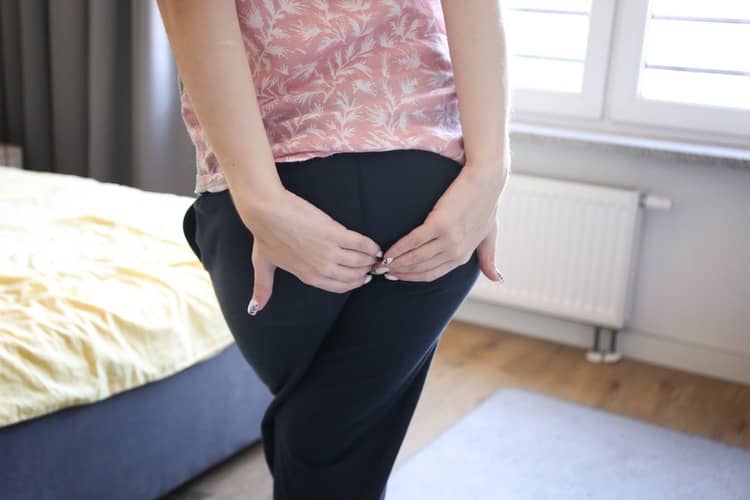
Golden vein in pregnancy
Problems with hemorrhoids are relatively widespread in the general population. In many cases, their treatment only requires time (or the use of suitable ointments or creams against hemorrhoids) and gradually the problem with the golden vein will mostly disappear. In general, they are caused by, for example, frequent diarrhea, constipation, improper diet, sedentary lifestyle, obesity, or activities that cause pressure and accumulation of blood in the rectal area. Such conditions include pregnancy. Genetic factors also have an influence on the development of this disease.
Hemorrhoids appear in up to 50% of women during pregnancy or after childbirth. Hemorrhoids are most often manifested during the 3rd trimester, before or after childbirth. After childbirth, they appear mainly due to high pressure in the area of the anus, which arose due to vaginal birth. Hemorrhoids after childbirth often go away on their own without the need for specific treatment. The problem with the golden vein occurs precisely when there are certain changes in the body that lead to the swelling of hemorrhoids.
In the case of pregnancy, the causes of hemorrhoids are quite obvious, because several significant changes take place in a woman's body. A higher rate of blood flow and an increased volume of blood flow lead to the enlargement, swelling or swelling of these veins. Progesterone production is responsible for the enlargement of the veins in this area. The hormone expands the blood vessels and increases the pressure in these places. The growth of the uterus and fetus is also behind the enlargement of the veins. These activities put pressure on the veins this area and worsen the blood flow to the lower limbs (also the reason for the appearance of varicose veins and swollen legs). Constipation or diarrhea are also common causes of hemorrhoids during pregnancy. Constipation causes higher pressure during the excretion of stool and increases the blood vessels.

Painful or bleeding hemorrhoids - symptoms
During pregnancy, hemorrhoids are often swollen and large. They increase their size up to several times. Depending on the stage of hemorrhoids and their location, they are most often manifested by discomfort in the area of the anus or more frequent itching.
However, bleeding hemorrhoids are no exception. This is fresh - bright red blood observable in the stool after emptying. During pregnancy, it is important to rule out by visiting a doctor whether it is another disease or, for example, bleeding from the birth. A golden vein can be complicated by inflammation or thrombosis, which can also cause bleeding. In case of bleeding, it is advisable to consult a doctor in all circumstances.
Burning is also an unpleasant symptom of hemorrhoids. These feelings can even cause pain during defecation and fear of stool. Painful hemorrhoids are very uncomfortable even during normal activities. Worrying about pain during defecation often leads to constipation, which causes the stool to harden and the subsequent pressure during defecation irritates the hemorrhoids again, which can start to bleed and hurt again.
How to treat hemorrhoids during pregnancy
This condition is not permanent in pregnant women or women after childbirth. After the end of pregnancy or a few weeks after giving birth, hemorrhoids are corrected by themselves after the drop in hormone levels, reduction of pressure in the abdomen, and also after lifestyle changes. Some women get better after a few days of giving birth, while others experience hemorrhoids just then. Treatment also depends on the stage of hemorrhoids. What about hemorrhoids in pregnancy? Home treatment of hemorrhoids consists primarily of regimen measures.
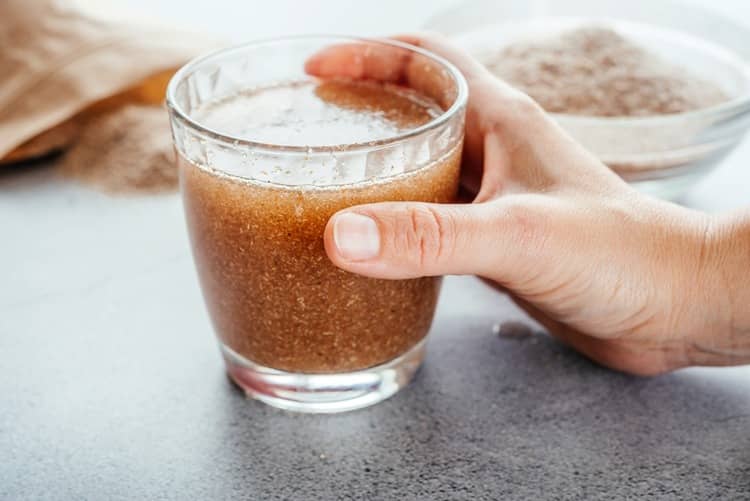
Sufficient fiber and drinking regime
Improving digestion and adjusting stool can be a big help. Constipation or, conversely, diarrhea is typical for pregnancy. Regular emptying and softening of the stool can be helped by the consumption of fruits, vegetables and cereals - apples, peas, carrots, lentils, whole grain bread, psyllium, pumpkin seeds, flax seeds and other foods that help with emptying. On the contrary, avoid spicy and spicy foods, which can irritate the anus. The drinking regime is important. With liquids, you should not go below the limit of 2 liters per day. It is also important not to hold back the stool. Also, be careful of excessive pressure during emptying.
Personal hygiene and sitz bath
Thorough hygiene is very important during hemorrhoids during pregnancy. After a stool, it is advisable to use wet wipes instead of classic toilet paper - for example, those designed for children without perfume, or wet toilet paper. It is even better if you always rinse the anus with clean water after a stool.
If hemorrhoid irritation is really unpleasant, we recommend trying a sitz bath using herbs such as chamomile, oak bark or rapeseed. Such sitz baths also work very well on bleeding or painful hemorrhoids. Rapeseed or chamomile have an anti-inflammatory effect at the same time. It is enough if you prepare such a decoction of herbs, for example in a lavatory, and sit in it for 10 to 15 minutes. A cold pack can also provide pain relief. Soak a towel in cold water, or wrap ice, frozen vegetables or a cold drink in it and place it on the anus. You can also try alternating cold and warm wraps.

Enough movement and exercise
Regular exercise can provide significant help to pregnant women. Which, of course, is not easy in every pregnancy. What is important, however, is that movement improves blood flow and blood circulation in the veins. Regular walks alone have a big benefit. Kegel exercises can significantly help blood circulation in the pelvic area. In addition to blood circulation, they also strengthen the muscles of the pelvic floor, which reduce the risk of uterine prolapse. Try to avoid sitting for long periods of time. When sleeping, try to find a position on your side.
Ointment for hemorrhoids or effective suppositories
Ointment from oak bark, comfrey or calendula ointment is suitable for hemorrhoids. Ointments help with emptying, but also reduce swelling, irritation and relieve itching or burning. For example, preparation H hemorrhoids ointment is suitable. Over-the-counter suppositories, such as Apotex HemaGel Procto or Avenoc suppositories, can be very helpful. Their purpose is to ensure that emptying is less painful and at the same time it is not necessary to exert excessive pressure during emptying.
Hemorrhoids in pregnancy - experience
In the case of discussions and forums led by pregnant women or mothers on the Internet, the main topic of discussion is finding solutions, what helped them with hemorrhoids during pregnancy. According to experience, many women had bleeding or painful hemorrhoids during pregnancy or after childbirth. Ointments or suppositories also helped them in relief, in addition to increasing fiber intake (Psyllium). Some of the women consulted a doctor and received prescription medication or reached for over -the-counter alternatives. Some women tried grandmother's recipes in the form of prunes. An interesting case is the case of one of the mothers, whose hemorrhoids appeared after giving birth and, despite her efforts, she has had problems with them for several years after giving birth.
The most frequent questions - FAQ
Do you suffer from hemorrhoids during pregnancy? Do you want to know what works for hemorrhoids during pregnancy or after childbirth? Do you know which ointment for hemorrhoids is suitable? Why do external hemorrhoids occur? You will find answers to these and other questions in our article. If you have experience with a golden vein during pregnancy, we would be happy if you would share your story with us. At the same time, we will be very happy if you have any interesting and effective recommendations that could be helpful for other pregnant women - mothers-to-be.
How do hemorrhoids manifest themselves during pregnancy?
How to treat hemorrhoids during pregnancy?
Why do bleeding hemorrhoids occur?
Pridať komentár

